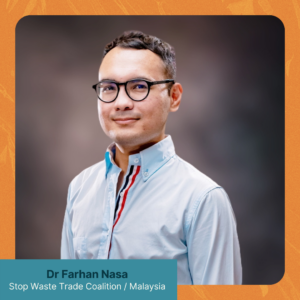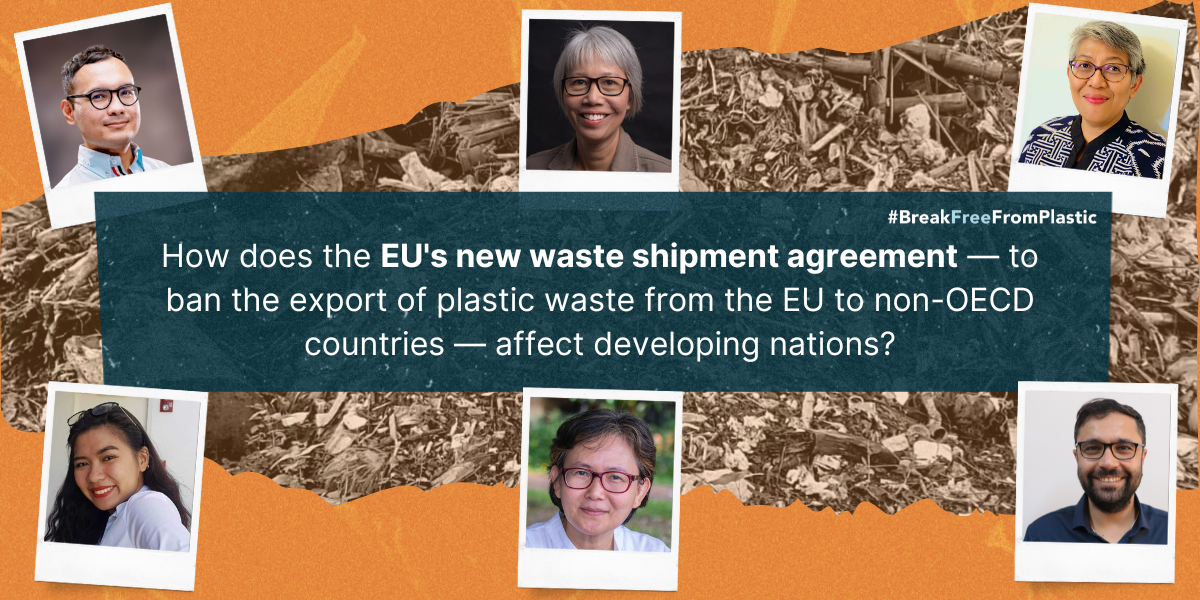Waste trade is often referred to as ‘waste colonialism’ due to the unequal and exploitative dynamics involved in the global movement of waste. The term highlights the power imbalance between economically developed countries of the Global North, typically the exporters of waste, and the less affluent nations that serve as recipients.
Plastic waste shipments from the European Union (and other Global North countries) have long been a thorny issue for Asian countries, which are destinations for these exports. Despite implementing import restrictions, bans, and protective measures to safeguard their environments, and even multilateral environmental agreements like the Basel Convention, Asian nations continue to bear the brunt of EU plastic waste, arriving through both illicit and legal channels. This persistent practice has led to detrimental consequences such as burning, dumping, and overwhelming domestic recycling capacities, impacting not only the health of workers and local communities but also the environment.
In response to the pressing need for targeted measures to address waste colonialism, members of Break Free From Plastic (BFFP) EU lobbied for a pivotal change in policy, pushing for a ban on plastic waste exports to both non-OECD and OECD countries. The call for action gained substantial public support, and over 180,000 signatures were collected to bolster the cause.
After years of campaigning from NGOs in Europe and across the world in recipient countries, EU institutions reached an agreement to address the harmful practice of the EU’s plastic waste trade, in November 2023.
Enter the new EU Waste Shipment Regulation — a landmark commitment embedded in the European Green Deal, the Circular Economy Action Plan, the Zero Pollution Action Plan, and the EU Strategy to tackle Organised Crime for the years 2021-2025. This regulation marks a significant stride toward addressing the adverse impacts of waste trade, with a particular focus on its implications for Asian nations.
The key takeaways from the regulation include a stringent prohibition on exporting any plastic waste to non-OECD countries within the next two and a half years. Obligations for exporting plastic waste to OECD countries are set to be reinforced. The shipping of waste destined for disposal in another EU country will be allowed only under exceptional circumstances, challenging the prevalent practices with a blanket prohibition. Additionally, the regulation promises to confirm safeguarding measures for other intra-EU shipments, marking a comprehensive effort to reshape the landscape of waste trade within the European Union and, by extension, its impact on Asian nations.
This regulation implies that the EU is finally beginning to take responsibility for its role in the global plastic pollution emergency. Yet further action from EU Member States is imperative if we are to truly address the environmental and societal implications of waste trade.
Here are more resources on the EU’s waste shipment regulation: European Commission Press Release, Rethink Plastic Alliance Press Release, and Nordea Invest Magazine.
So what does the new EU waste shipment regulation mean for Asian countries? BFFP member organisations from Asia weigh in:
 I saw firsthand the influx of foreign wastes in Malaysia while working as a research assistant in 2018, and the impacts illegal foreign waste dumping had on the local environment and surrounding communities. I recently went back again to the same sites I visited then, to investigate the legacy impacts. The long-term effects of plastic pollution are apparent in the soil flecked with microplastic debris and in the nearby water drains. The lack of individual site remediation is an issue and we are still researching the health impacts on the local population, but it’s pretty clear that insufficiently regulated waste trade is an ongoing battle that requires commitment from local authorities as well as the international community to consistently plug the leak in the system, and curb illegal activities from recurring or taking new forms. The EU ban is a step in the right direction to honour that commitment. Exported wastes = exported pollution.
I saw firsthand the influx of foreign wastes in Malaysia while working as a research assistant in 2018, and the impacts illegal foreign waste dumping had on the local environment and surrounding communities. I recently went back again to the same sites I visited then, to investigate the legacy impacts. The long-term effects of plastic pollution are apparent in the soil flecked with microplastic debris and in the nearby water drains. The lack of individual site remediation is an issue and we are still researching the health impacts on the local population, but it’s pretty clear that insufficiently regulated waste trade is an ongoing battle that requires commitment from local authorities as well as the international community to consistently plug the leak in the system, and curb illegal activities from recurring or taking new forms. The EU ban is a step in the right direction to honour that commitment. Exported wastes = exported pollution.
Dr. Farhan Nasa, Malaysia Stop Waste Trade Coalition, based in Malaysia.
 Malaysia is a target country for global waste and the health of local communities have been continuously impacted by this waste colonialism. We commend the EU for taking this stance to ban plastic waste exports to non-OECD countries like Malaysia. We appreciate the support from all the Malaysian EU countries embassies highlighting the issue with their counterparts in the EU parliament of the detrimental effects of mismanaged EU waste shipments in Malaysia. The porous borders in Malaysia and the limitations of the Malaysian enforcement agencies where corruption and complacency breeds further highlights the importance of this ban. We are encouraged that this ban was announced at a time when globally, nations are negotiating a legally binding instrument on plastic pollution and hope that other nations including those that are still exporting their waste to Malaysia such as Japan and the US, will take inspiration from this. Back in Malaysia, we hope the government continues its effort to establish necessary guidelines and regulations across all relevant agencies such as the Trade and Industry ministries and customs to enable seamless enforcement once the ban comes into effect in 2.5 years.
Malaysia is a target country for global waste and the health of local communities have been continuously impacted by this waste colonialism. We commend the EU for taking this stance to ban plastic waste exports to non-OECD countries like Malaysia. We appreciate the support from all the Malaysian EU countries embassies highlighting the issue with their counterparts in the EU parliament of the detrimental effects of mismanaged EU waste shipments in Malaysia. The porous borders in Malaysia and the limitations of the Malaysian enforcement agencies where corruption and complacency breeds further highlights the importance of this ban. We are encouraged that this ban was announced at a time when globally, nations are negotiating a legally binding instrument on plastic pollution and hope that other nations including those that are still exporting their waste to Malaysia such as Japan and the US, will take inspiration from this. Back in Malaysia, we hope the government continues its effort to establish necessary guidelines and regulations across all relevant agencies such as the Trade and Industry ministries and customs to enable seamless enforcement once the ban comes into effect in 2.5 years.
Si Peng Wong, Events & Project Officer, Center to Combat Corruption and Cronyism (C4 Center), based in Malaysia.

"We welcomed this decision but we also would like to see and hear more about the EU strategies and plans to increase the enabling system and infrastructure to support higher recycling capacity within the EU region, increased law enforcement and inspections at key ports, as well as upstream policy to control production of plastic packaging and chemicals of concern. Support to increase capacity building to prevent dumping in vulnerable OECD countries, like Turkey and Mexico, is needed."
Yuyun Ismawati Drwiega, Senior Advisor of Nexus3 Foundation, based in Indonesia.
 Damage has been done to ill-equipped countries that can't even manage their own domestic waste. The European Union banning plastic waste imports to non-OECD countries is a huge step to end waste colonialism, yet we are still to see the details of the measure. Without strong enforcement, strict implementation, and justice to affected communities in importing countries, waste crimes will still persist.
Damage has been done to ill-equipped countries that can't even manage their own domestic waste. The European Union banning plastic waste imports to non-OECD countries is a huge step to end waste colonialism, yet we are still to see the details of the measure. Without strong enforcement, strict implementation, and justice to affected communities in importing countries, waste crimes will still persist.
Coleen Salamat, Project Coordinator for Waste Trade, Break Free From Plastic Asia-Pacific Coordination Team.
 We welcome the revision of the EU Waste Shipment Regulation. The European Commission’s proposal aims to ensure that the EU does not export its waste challenges to third countries, and supports a clean and circular economy in addition to setting out new measures to better tackle illegal waste shipments.
We welcome the revision of the EU Waste Shipment Regulation. The European Commission’s proposal aims to ensure that the EU does not export its waste challenges to third countries, and supports a clean and circular economy in addition to setting out new measures to better tackle illegal waste shipments.
With regard to the EU’s trade of plastic waste, the reason for such measures is clear. The plastic waste trade causes untold environmental and human health harm. Thailand is trying to push for a ban on the importation of plastic scraps. It has also recently ratified the Amendment to the Basel Convention in March, meaning that after the date of implementation in June 2023, nations of the European Union, the OECD and Lichtenstein, will no longer be allowed to export hazardous waste under the convention to Thailand.
Despite these efforts, Thailand is still affected by illegally imported waste. Last year, 130 tons of municipal waste containing plastic was found in our port. These incidences show that restrictions and bans by destination countries are insufficient. We need exporters such as the EU to stop sending plastic to Thailand, to end the trade of plastic waste for good.
Penchom Saetang, Executive Director, EARTH Thailand, based in Thailand.

The latest waste shipment regulation from the EU includes both positive and negative aspects. On the positive side, the EU has acknowledged that it is not advisable to export its plastic waste to non-OECD countries. As a result, the EU will no longer ship waste to these countries, although this will be phased in over 2.5 years. However, the negative aspect of this regulation concerns the fate of plastic waste that has already been sent to non-OECD countries. While it is acknowledged that there will be restrictions and conditions for OECD countries, there is no guarantee that these will not be breached. This is because the illegal transfer of plastic waste with false declarations and labelling is the most prevalent characteristic of plastic waste shipment, effectively turning the trade into a colonial activity. Turkey is a prime example of this issue. This is because the illegal transfer of plastic waste with false declarations and labelling is the most prevalent characteristic of plastic waste shipment, effectively turning the trade into a colonial activity. To prevent toxic colonialism, the EU must ban the export of plastic waste. This is the only way to have a fair system.
Sedat Gündoğdu, Researcher, Microplastic Research Group,Cukurova Üniversitesi, based in Turkey.




